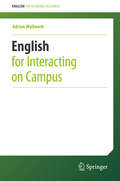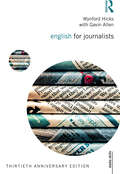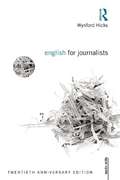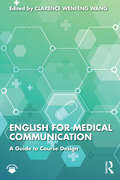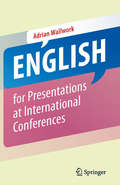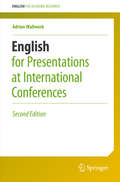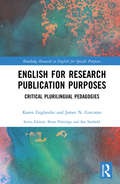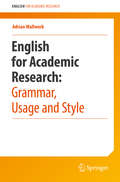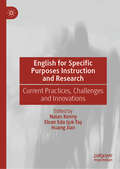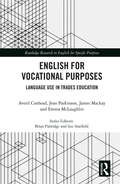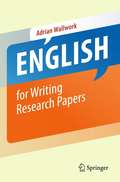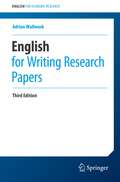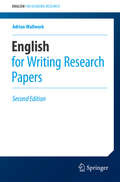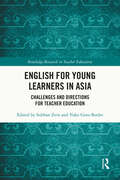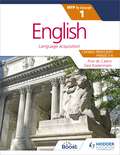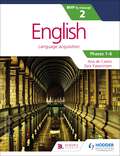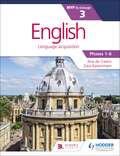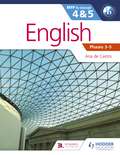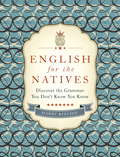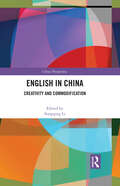- Table View
- List View
English for Interacting on Campus
by Adrian WallworkThis volume covers the day-to-day activities of a non-native English speaking student carrying out research, attending lectures, socializing, and living in a foreign country. Whether on a US campus as a foreign student, or in a non-English speaking country where classes are given in English, this book will help students build confidence in interacting with professors and fellow students.
English for Journalists: Thirtieth Anniversary Edition (Media Skills)
by Wynford Hicks Gavin AllenEnglish for Journalists has established itself in newsrooms the world over as an invaluable guide to the basics of English and to those aspects of writing, such as reporting speech, house style and jargon, which are specific to the language of journalism. Written in a highly accessible and engaging style, English for Journalists covers the fundamentals of grammar, spelling, punctuation and journalistic writing, with all points illustrated through a series of concise and illuminating examples. The book features practical, easy-to-follow advice with examples of common mistakes and problem words. This thirtieth anniversary edition features a revised first chapter on the state of English today by author Wynford Hicks, and a chapter on writing for social media by Gavin Allen, along with an updated glossary and references. This is an essential guide to written English for practising journalists and students of journalism today.
English for Journalists: Twentieth Anniversary Edition (Media Skills)
by Wynford HicksEnglish for Journalists has established itself as an invaluable guide to the basics of English in newsrooms the world over, focusing on the essential aspects of writing, from reporting speech to the house styles and jargon central to the language of journalism. Written in a highly accessible and engaging style, English for Journalists covers the fundamentals of grammar, spelling, punctuation and journalistic writing, with all points illustrated through a series of concise and illuminating examples. The book features practical, easy to follow rules, the correct and incorrect ways to report stories, and examples of common mistakes and problem words in journalistic writing. The twentieth anniversary edition adds a new introduction to the work from author Wynford Hicks, as well as updated examples throughout to improve accessibility, and a revised first chapter on the state of English today. This is an essential guide to written English for all practicing journalists and students of journalism today.
English for Medical Communication: A Guide to Course Design
by Clarence Wenfeng WangEnglish for Medical Communication: A Guide to Course Design is a practical guide to the design of health communication courses in English for Academic/Specific Purposes (EAP/ESP). Written by an experienced team of EAP/ESP practitioners teaching communication courses to medical students, the chapters cover ten key areas in medical communication, such as reporting patient history, writing a medico-legal report, discussing ethical cases, writing a Wikipedia article in medicine, and presenting community project findings in a research report.The book covers medical communication among healthcare professionals with laypersons and researchers. Each chapter introduces course design principles, teaching approaches and techniques, course materials with effective classroom tasks, and students’ sample assignments. Each chapter also provides resources to support teachers in designing courses in a wider international context.Including up-to-date literature on key concepts and core understandings and best practices in medical communication, this accessible volume is an essential guide for language teachers of EAP/ESP programs designing courses for medical students at both undergraduate and postgraduate levels worldwide.
English for Presentations at International Conferences
by Adrian WallworkGood presentation skills are key to a successful career in academia. This book is the first guide to giving presentations at international conferences specifically written for researchers of all disciplines whose first language is not English.<P><P> With easy-to-follow rules and tips, and with examples taken from real presentations, you will learn how to:<P> * avoid errors in English by using short easy-to-say sentences<P> * improve your English pronunciation and intonation<P> * gain confidence, and overcome nerves and embarrassment<P> * plan, prepare and practice a well-organized, interesting presentation<P> * highlight the essential points you want your audience to remember<P> * deal with questions from the audience<P> * decide what to say at each stage of the presentation<P> * use standard phrases<P> * attract and retain audience attention
English for Presentations at International Conferences, Second edition
by Adrian WallworkGood presentation skills are key to a successful career in academia. This guide provides examples taken from real presentations given both by native and non-native academics covering a wide variety of disciplines.<P><P> The easy-to-follow guidelines and tips will teach you how to: <P> * plan, prepare and practice a well-organized, interesting presentation<P> * avoid errors in English by using short easy-to-say sentences<P> * improve your English pronunciation and intonation<P> * gain confidence, and overcome nerves and embarrassment<P> * highlight the essential points you want your audience to remember<P> * attract and retain audience attention<P> * deal with questions from the audience<P> This new edition contains several additional features, including stimulating factoids and discussion points both for self-study and in-class use. New chapters also cover:<P> * learning from talks on TED<P> * networking with potential collaborators, professors, fellow researchers<P> * interacting successfully with non-native audiences<P> * posters<P> EAP teachers will find this book to be a great source of tips for training students, and for preparing both instructive and entertaining lessons.
English for Research Publication Purposes: Critical Plurilingual Pedagogies (Routledge Research in English for Specific Purposes)
by Karen Englander James N. CorcoranScholars who use English as an additional language confront challenges when disseminating their research in the global market of knowledge production dominated by English. English for Research Publication Purposes analyses the experiences and practices of these scholars across the globe and presents "critical plurilingual pedagogies" as a theoretically and empirically informed means of supporting them. This book: • Draws on an empirical study of a Latin American university’s effort to mount a course that provides support to emerging and established scholars who use English as an additional language; • Brings theoretically informed discussions of critical pedagogies, plurilingualism and identity affirmation to better serve plurilingual scholars who seek to publish their research in English-language journals; • Provides examples of classroom activities that can be adapted and adopted to local contexts and realities in a curriculum based on critical plurilingual pedagogies; • Proposes future directions for research into the internationally urgent, growing concerns of global scholars who produce English-medium academic knowledge for the world stage. Incisive and cutting-edge, English for Research Publication Purposes will be key reading for academics and upper-level students working in the areas of ESP, EAP, ERPP, and Applied Linguistics.
English for Research: Usage, Style, and Grammar
by Adrian WallworkPacked with hundreds of real-life examples, this book covers areas of English usage that typically cause researchers difficulty. It focuses on specific errors that repeatedly appear in papers written by non-native authors, making it an ideal study guide.
English for Specific Purposes Instruction and Research: Current Practices, Challenges and Innovations
by Nalan Kenny Elvan Eda Işık-Taş Huang JianThis edited book focuses on current practices, challenges and innovations in the emerging field of English for Specific Purposes (ESP). By combining diverse, empirically-proven and innovative ESP practices from all over the world with inspiring theoretical input and reflections from experienced practitioners, the authors in this volume examine both best-practice examples and ESP programmes which by various metrics are deemed to have failed. This book will be of interest to practitioners, teacher educators and researchers working in the field of ESP, as well as readers interested in language education and curriculum development more broadly.
English for Vocational Purposes: Language Use in Trades Education (Routledge Research in English for Specific Purposes)
by James Mackay Emma McLaughlin Averil Coxhead Jean ParkinsonEnglish for Vocational Purposes provides a linguistic description of English in the context of the trades and investigates how this specialist language is used in real-world contexts. As the demand for English-speaking workers in the trades grows internationally, a major gap in the research on language in the trades is evident. Based on courses in construction and engineering at a polytechnic in New Zealand, this book offers an empirical response to this gap in research. Features of this book include: new research on linguistic features of written and spoken texts in trades education, with a special focus on discourse, visual elements of written texts and vocabulary; real-life examples of the language in context, along with implications for teaching and learning and a chapter devoted to putting research findings into practice; qualitative and quantitative data to support examples and shed light on the most complex aspects of English as a trades language; supplementary material online which includes technical word lists in areas of carpentry, plumbing, automotive technology and fabrication (welding). Paving the way for a new research agenda in the field of ESP, English for Vocational Purposes is key reading for advanced students, researchers and practitioners in the areas of ESP, trades education and vocational education.
English for Writing Research Papers
by Adrian WallworkPublishing your research in an international journal is key to your success in academia. This guide is based on a study of referees' reports and letters from journal editors on reasons why papers written by non-native researchers are rejected due to problems with English usage. It draws on English-related errors from around 5000 papers written by non-native authors, 500 abstracts by PhD students, and over 1000 hours of teaching researchers how to write and present research papers.<P><P> With easy-to-follow rules and tips, and with examples taken from published and unpublished papers, you will learn how to:<P> * prepare and structure a manuscript<P> * increase readability and reduce the number of mistakes you make in English by writing concisely, with no redundancy and no ambiguity<P> * plan and organize your paper, and structure each paragraph and each sentence so that the reader can easily follow the logical build-up towards various conclusions<P> * write a title and an abstract that will attract attention and be read<P> * decide what to include in the various parts of the paper (Introduction, Methodology, Discussion etc)<P> * select from over 700 useful phrases<P> * highlight your claims and contribution<P> * avoid plagiarism and make it 100% clear whether you are referring to your own work or someone else’s<P> choose the correct tenses and style (active or passive)<P>
English for Writing Research Papers (English for Academic Research)
by Adrian WallworkPublishing your research in an international journal is key to your success in academia. This guide is based on a study of over 1000 manuscripts and reviewers' reports revealing why papers written by non-native researchers are often rejected due to problems with English usage and poor structure and content. With easy-to-follow rules and tips, and examples taken from published and unpublished papers, you will learn how to: prepare and structure a manuscriptincrease readability and reduce the number of mistakes you make in English by writing concisely, with no redundancy and no ambiguitywrite a title and an abstract that will attract attention and be readdecide what to include in the various parts of the paper (Introduction, Methodology, Discussion etc)highlight your claims and contributionavoid plagiarismdiscuss the limitations of your researchchoose the correct tenses and stylesatisfy the requirements of editors and reviewers This edition has two completely new chapters covering machine translation and using AI tools (e.g. chatbots, paraphrasers, editing tools) to improve and correct the English of a text. Other titles in this series: Grammar, Usage and Style Grammar, Vocabulary, and Writing Exercises (three volumes) 100 Tips to Avoid Mistakes in Academic Writing and Presenting English for Presentations at International Conferences English for Academic Correspondence English for Interacting on Campus English for Academic CVs, Resumes, and Online Profiles English for Academic Research: A Guide for TeachersAdrian Wallwork is the author of more than 40 English Language Teaching (ELT) and English for Academic Purposes (EAP) textbooks. He has trained several thousand PhD students and researchers from 50 countries to write papers. He edits research manuscripts through his own proofreading and editing agency.
English for Writing Research Papers, 2nd Edition
by Adrian WallworkPublishing your research in an international journal is key to your success in academia. This guide is based on a study of over 1000 manuscripts and reviewers' reports revealing why papers written by non-native researchers are often rejected due to problems with English usage and poor structure and content. <P><P> With easy-to-follow rules and tips, and examples taken from published and unpublished papers, you will learn how to:<P> * prepare and structure a manuscript<P> * increase readability and reduce the number of mistakes you make in English by writing concisely, with no redundancy and no ambiguity<P> * write a title and an abstract that will attract attention and be read<P> * decide what to include in the various parts of the paper (Introduction, Methodology, Discussion etc)<P> * highlight your claims and contribution<P> * avoid plagiarism<P> * discuss the limitations of your research<P> * choose the correct tenses and style<P> * satisfy the requirements of editors and reviewers<P> This new edition contains over 40% new material, including two new chapters, stimulating factoids, and discussion points both for self-study and in-class use.
English for Young Learners in Asia: Challenges and Directions for Teacher Education (Routledge Research in Teacher Education)
by Subhan ZeinIn the first book to concentrate on teacher education for English for young learners (EYL) teachers in Asia, Zein and Butler offer a comprehensive coverage of teacher education by addressing various issues and recent developments such as programme evaluation, knowledge base, practicum, classroom discourse, needs analysis, and policy on teacher education. The world’s rapidly changing political, social, economic, and educational landscapes in the 21st century have been distinctively characterized by an increasing number of children who are learning English globally at younger ages. This book tackles the challenges and complexities surrounding teacher education by examining the policies and practices of primary English language teacher education in a variety of educational contexts, namely Bangladesh, China, Indonesia, Japan, Kazakhstan, Thailand, and South Korea. Using a variety of data collection methods like interviews, reflective journals, and questionnaires, the content delves into the different strategies and initiatives that have been implemented or proposed to improve teacher education. A vital read for academics and students in the fields of early language learning, Teaching English to Speakers of Other Languages (TESOL), Applied Linguistics, Educational Linguistics, English Language Education, and comparative education studies, as well as teacher educators aiming to advance the teaching of English in Asia and beyond.
English for the IB MYP 1
by Zara Kaiserimam Ana de Castro Stephanie BarrusExam Board: MYPLevel: IBSubject: EnglishFirst Teaching: September 2016First Exam: June 2017Develop your skills to become an inquiring learner; ensure you navigate the MYP framework with confidence using a concept-driven and assessment-focused approach to English presented in global contexts.- Develop conceptual understanding with key MYP concepts and related concepts at the heart of each chapter.- Learn by asking questions with a statement of inquiry in each chapter. - Prepare for every aspect of assessment using support and tasks designed by experienced educators.- Understand how to extend your learning through research projects and interdisciplinary opportunities.
English for the IB MYP 1
by Zara Kaiserimam Ana de CastroExam Board: MYPLevel: IBSubject: EnglishFirst Teaching: September 2016First Exam: June 2017Develop your skills to become an inquiring learner; ensure you navigate the MYP framework with confidence using a concept-driven and assessment-focused approach to English presented in global contexts.- Develop conceptual understanding with key MYP concepts and related concepts at the heart of each chapter.- Learn by asking questions with a statement of inquiry in each chapter. - Prepare for every aspect of assessment using support and tasks designed by experienced educators.- Understand how to extend your learning through research projects and interdisciplinary opportunities.
English for the IB MYP 2
by Zara Kaiserimam Ana de Castro Stephanie BarrusA concept-driven and assessment-focused approach to English language acquisition teaching and learning.- Approaches each chapter with statements of inquiry framed by key and related concepts, set in a global context- Supports every aspect of assessment using tasks designed by an experienced MYP educator- Differentiates and extends learning with research projects and interdisciplinary opportunities- Applies global contexts in meaningful ways to offer an MYP English programme with an internationally-minded perspective
English for the IB MYP 2
by Zara Kaiserimam Ana de CastroA concept-driven and assessment-focused approach to English language acquisition teaching and learning.- Approaches each chapter with statements of inquiry framed by key and related concepts, set in a global context- Supports every aspect of assessment using tasks designed by an experienced MYP educator- Differentiates and extends learning with research projects and interdisciplinary opportunities- Applies global contexts in meaningful ways to offer an MYP English programme with an internationally-minded perspective
English for the IB MYP 3
by Zara Kaiserimam Ana de Castro Stephanie BarrusExam board: International BaccalaureateLevel: MYPSubject: EnglishFirst teaching: September 2014First exams: Summer 2016Develop your skills to become an inquiring learner; ensure you navigate the MYP framework with confidence using a concept-driven and assessment-focused approach to English presented in global contexts.- Develop conceptual understanding with key MYP concepts and related concepts at the heart of each chapter.- Learn by asking questions with a statement of inquiry in each chapter. - Prepare for every aspect of assessment using support and tasks designed by experienced educators.- Understand how to extend your learning through research projects and interdisciplinary opportunities.
English for the IB MYP 3
by Zara Kaiserimam Ana de CastroExam board: International BaccalaureateLevel: MYPSubject: EnglishFirst teaching: September 2014First exams: Summer 2016Develop your skills to become an inquiring learner; ensure you navigate the MYP framework with confidence using a concept-driven and assessment-focused approach to English presented in global contexts.- Develop conceptual understanding with key MYP concepts and related concepts at the heart of each chapter.- Learn by asking questions with a statement of inquiry in each chapter. - Prepare for every aspect of assessment using support and tasks designed by experienced educators.- Understand how to extend your learning through research projects and interdisciplinary opportunities.
English for the IB MYP 4 & 5: MYP by Concept (MYP By Concept)
by Ana de CastroWe are working with the IBO to gain endorsement for the MYP by Concept series.Drive meaningful inquiry for the new framework through a unique concept driven narrative.- Supports every aspect of assessment with opportunities that use the criteria- Gives you easy ways to differentiate and extend learning- Provides a meaningful approach by integrating the inquiry statement in a global context- Develops critical-thinking skills with activities and summative sections rooted in the ATL frameworkAlso coming soon are Teaching and Learning Resources and eTextbooks via Dynamic Learning, our complete digital solution.
English for the IB MYP 4 & 5: MYP by Concept (MYP By Concept)
by Ana de CastroWe are working with the IBO to gain endorsement for the MYP by Concept series.Drive meaningful inquiry for the new framework through a unique concept driven narrative.- Supports every aspect of assessment with opportunities that use the criteria- Gives you easy ways to differentiate and extend learning- Provides a meaningful approach by integrating the inquiry statement in a global context- Develops critical-thinking skills with activities and summative sections rooted in the ATL frameworkAlso coming soon are Teaching and Learning Resources and eTextbooks via Dynamic Learning, our complete digital solution.
English for the Natives: Discover The Grammar You Don't Know You Know
by Harry Ritchie'My first English lesson was grammar with the terrifying Mrs Petrie. She spent the entire time marching up and down the classroom, thwacking various items of school furniture with a ruler while she banged on about the ING part of the verb. I sat there, vibrating with fear, desperately trying to figure out what on earth she could mean. Irregular Negative Gerund? Intransitive Nominative Genitive? It was only years later, when I was teaching English to foreign students, that I realised that English grammar wasn't obscure and wilfully difficult but a fascinating subject which I was already brilliant at - and this book will prove that you are too.'Forget the little you think you know about English grammar and start afresh with this highly entertaining and accessible guide. English for the Natives outlines the rules and structures of our language as they are taught to foreign students - and have never before been explained to us. Harry Ritchie also examines the grammar of dialects as well as standard English and shows how non-standard forms are just as valid. With examples from a wide variety of sources, from Ali G to John Betjeman, Margaret Thatcher to Match of the Day, this essential book reveals some surprising truths about our language and teaches you all the things you didn't know you knew about grammar.
English for the Natives: Discover the Grammar You Don't Know You Know
by Harry Ritchie'My first English lesson was grammar with the terrifying Mrs Petrie. She spent the entire time marching up and down the classroom, thwacking various items of school furniture with a ruler while she banged on about the ING part of the verb. I sat there, vibrating with fear, desperately trying to figure out what on earth she could mean. Irregular Negative Gerund? Intransitive Nominative Genitive? It was only years later, when I was teaching English to foreign students, that I realised that English grammar wasn't obscure and wilfully difficult but a fascinating subject which I was already brilliant at - and this book will prove that you are too.'Forget the little you think you know about English grammar and start afresh with this highly entertaining and accessible guide. English for the Natives outlines the rules and structures of our language as they are taught to foreign students - and have never before been explained to us. Harry Ritchie also examines the grammar of dialects as well as standard English and shows how non-standard forms are just as valid. With examples from a wide variety of sources, from Ali G to John Betjeman, Margaret Thatcher to Match of the Day, this essential book reveals some surprising truths about our language and teaches you all the things you didn't know you knew about grammar.
English in China: Creativity and Commodification (China Perspectives)
by Songqing LiEnglish-related linguistic creativity and language commodification are a constant topic of interest and analysis for scholars. This volume is intended to initiate a dialogue between these two domains of inquiry that have been abundantly addressed but rarely documented together or in relation to one another. English as used in mainland China is presented as a case study where it remains rather unclear the extent to which the language is actually used in people’s lives, outside the domain of education. The volume enriches existing empirical studies by exploring the creative and innovative uses of English in people’s lives and its commodification at different language-centred economic spaces within China while also providing an update of our understanding of the sociolinguistic situation of English in China, a country undergoing rapid socio-economic transformation. English in China is the first attempt to discuss the possible relationship, intersection, and tension between two seemingly inseparable research topics. The book is an important resource for students and scholars in the fields of Applied Linguistics, Bilingualism, Sociolinguistics, Translation, and Contemporary Chinese Studies.
